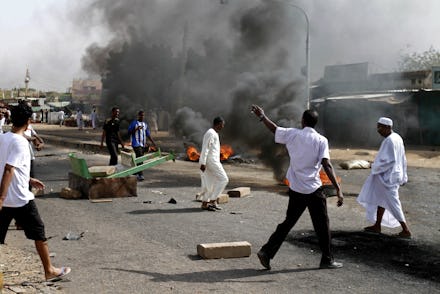Sudanese Government is Implementing a Vicious, Coordinated Plan to Starve Its People

Sudan is once again the stage for one of humanity’s worst crises. For the past few weeks, another round of protests has erupted in Sudan. Protesters are angry about the government recent cuts in social programs and subsidies. Sudan’s government has run into budget woes ever since South Sudan seceded and took the large share of oil reserves, leaving the government running billion dollar deficits. Protesters are demanding basic rights such as freedom of speech, transparency and democracy, in addition for the resignation of President Omar Al Bashir. The protesters have been met by the government with a violent crackdown, with dozens of protesters killed. Sudan’s president, in addition to Sudan’s defense minister and South Kordofan state governor have all been indicted by the International Criminal Court for their role in committing crimes against humanity and genocide in Darfur.
For the majority of past three years, the Nuba Moutains of South Kordofan has witnessed a siege on the Nuba people by the Government of Sudan forces. A coordinated policy of starvation has led to one of the worst humanitarian crisis of our modern times. Hundreds of thousands of civilians are starving to death. Currently, the situation in the Nuba Mountains is dire and requires a serious commitment by the international community. The UN office for the Coordination of Humanitarian Affairs (UNOCHA) and humanitarian agencies have called to allow humanitarian aid to reach affected populations, but the Sudanese government’s ban on humanitarian agencies, including the UN, has limited the ability to distribute much needed aid. While we stand by, tens of thousands of civilians may die from starvation due to the government's policy. The people of the Nuba Mountains are once again targets of a policy bordering on genocide.
Sudan’s second civil war, which lasted two decades, saw nearly two million deaths. It ended in late 2004 with the signing of the Comprehensive Peace Accord (CPA). Among many of its provisions, the CPA allowed the people of then-Southern Sudan to vote in a referendum to determine the status of South Sudan. They overwhelmingly voted to secede from Sudan in January of 2011, and on July 9, 2011, became their own independent state. However, referendums in border state and disputed regions such as South Kordofan state, and the Abyei Region did not go occur.
The people of the Nuba Mountains were not allowed to participate in the January 2011 referendum, an action which many regarded as another measure of discrimination taken by the central government of Sudan. The people of the Nuba Mountains had historically fought with the South in the Sudanese civil war. Many of the rebel recruits during that war were natives of the Nuba Mountains. Two decades earlier, 100,000 were reportedly killed in the Nuba Mountains at the hands of the Sudanese Government between 1992 and 1993. Today, the Nuba Mountains falls within the territories of Sudan, in the South Kordofan State. This state has witnessed fighting since early 2011 between the government of Sudan and rebel groups.
The government of Sudan has implemented similar strategies that it infamously used in its genocidal campaign in the region of Darfur. This included the discriminate bombardment of civilians, razing of houses and the extra-judicial arrests of individuals suspected of being rebel sympathizers. Additionally, the Sudanese government has kicked out international organizations and has not allowed reporters from working in the area. The region is considered a non-permissive environment, blocked from the world.
Satellite monitoring projects such as the Satellite Sentinel Project and the Signal Program for Human Security and Technology have helped shed a light about the atrocities being committed in the region. They have documented the encirclement and siege of those areas, in addition to the reported discriminate bombardments of civilians. In one particular instance, an Antonov Bomber, a Russian transport plane which the Sudanese Air Force has retrofitted to use for bombing purposes, was captured in a satellite image. In the same image, four smokes plumes are visible rising from agricultural fields.
This satellite image corroborates reports from the ground by NGOs and reporters who have snuck into the region and reported on this situation. According to eye witnesses and reporters, this campaign of discriminate bombardment has scared off civilians from the fields, reducing crop production to dangerous low levels. According to one report in January 2013 by the Humanitarian Aid Relief Trust (HART), they reported that “The sustained aerial bombardment has also prevented people from planting or harvesting crops, causing serious and escalating malnutrition and associated diseases.”
It's imperative that the international community takes actions immediately to bring full, unhindered humanitarian aid to this region and not forget the atrocities occurring there. As of now, Bashir continues to violate international norms, all the while mocking the UN by having threatened to attend this past UNGA. Our conscience cannot accept this as status quo.